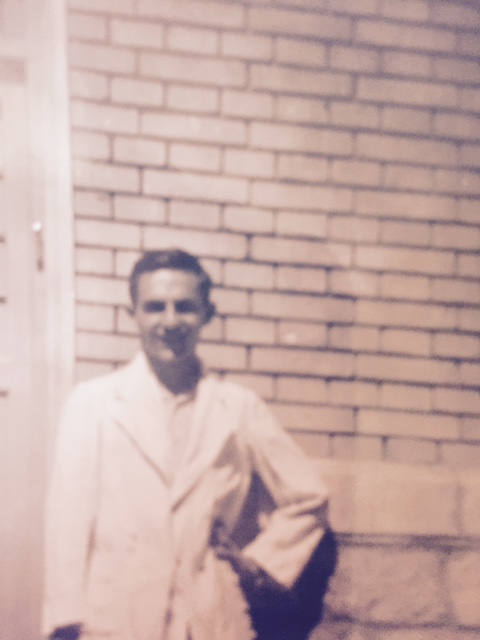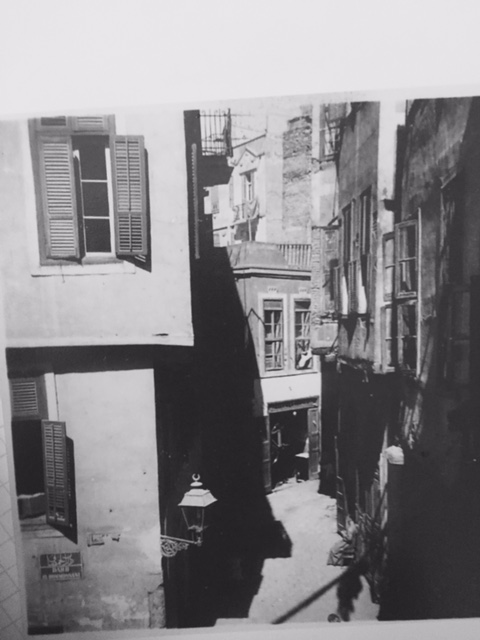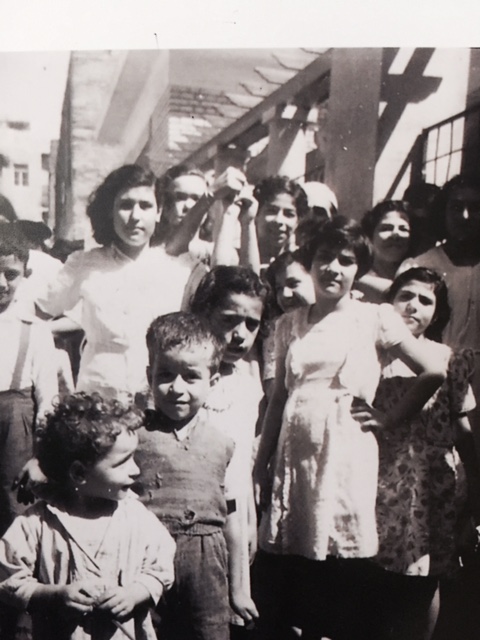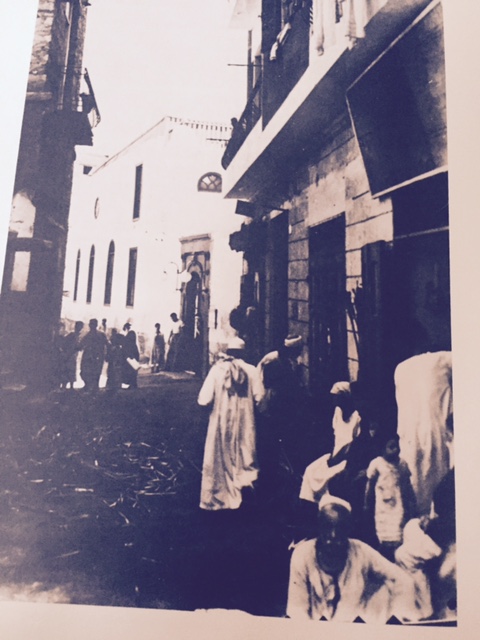“It is just so unfaithful to the truth. This is not Haret Al-Yahoud and this is not what the Jews who lived there looked like or dressed like,” said Albert Arie.
Albert Jacques Arie, who celebrated his 85th birthday on Thursday, has been living in the same downtown Cairo apartment where his parents married and lived since the early 1930s.
Like other upper middle class Egyptian Jews from downtown Cairo, Garden City and Heliopolis, Arie attended the Lycee Francais, spoke French at home and frequented the tea rooms in the centre of the city.
While still in his teens and a student at the Fouad I (now Cairo) University School of Arts, Albert and another member of the same communist movement, Roger – who happened to be Jewish as well – arrived in October 1947 at Haret Al-Yahoud, or the Jewish Alley.

Albert Arie during a visit to the Jewish alley in 1947 as part of an awareness campaign fighting the outbreak of cholera (Photo courtesy of Albert Arie)
“It was my first time ever to be there and I was so struck by the images of poverty; poverty was all over, the people were poor and the houses were poor. They were certainly ever so remote from the images that we are being offered in this Ramadan’s soap opera,” Arie told Ahram Online as he shared a few black and white photos from his “excursion” to the alley only months before the outbreak of the 1948 war.
“In reality there were very poor workers – too poor to frequent brothels that were never in the alley anyway,” Arie said. He added that they were barely literate and were doing small jobs to make a living.
But, he said, “in the soap opera we see middle class, even lower middle class, people who dance tango, read Albert Camus and dress nicely – although of course there is a serious sartorial fault because the way the actors are dressed in the soap opera is not faithful to the way people dressed back then.”
Arie went on to say the Jewish Alley was never a ghetto “because nobody was forcing the poor Jews to live there, they just clustered there anyway.”
“But for sure there was not that wide a mix of people of different faiths and different interests,” he added.
“The image that the soap opera is trying to offer is perhaps closer to Abbassiyah or Sakakini neighbourhoods where, yes, in the mid-1940s you could see a blend of families of different faiths from the middle class interacting this way,” Arie said.

Egypt's Jewish alley in 1947 (Photo courtesy of Albert Arie)
“But it has to be called Haret Al-Yahoud because commercially it would make money and because clearly there is someone who decided, for one reason or another to end the established portrayal of the Jews of Egypt as spies and traitors who were born to be mean,” Arie said.
Then again, Arie is at least surprised by the “naïve attempt” to overlook some very basic historic facts by the writers of the soap opera.
“It is so funny, I found, that we are seeing an exchange of love letters between an Egyptian who is fighting in the 1948 war and a Jewish girlfriend. It is really so funny that in these letters the Egyptian soldier is telling his girlfriend about the war,” he said.
At the time, Arie said, all the leading officers who were married to Jewish women were exempted from serving in sensitive positions – even if their wives had converted to Islam.
“There is the famous story of Othman Fawzy who was not accepted by the Royal Guards because of his marriage with Didar, a Jewish lady who had converted to Islam,” he recalled.
According to Arie, anyone who lived at the time knows very well that an Egyptian officer serving in the war could not write freely to a Jewish girlfriend.
“It is impossible; such letters would have been intercepted immediately by the intelligence and by the army. It is silly to even suggest that this could have happened,” he said.

Some of the residents of Egypt's Jewish alley in 1947 (Photo courtesy of Albert Arie)
Arie, who was born into a Jewish family in Egypt but converted to Islam in the 1960's to marry a Muslim woman, has never left the country despite the endless opportunities.
He knew from the early days of his youth that he could not accept Zionism, and worked along with members of the leftist Democratic Movement for National Liberation (Hadeto), to combat the ideology. Arie is shocked by the “confused and misleading portrayal” of the Jewish followers of Zionism in Egypt being portrayed as communists.
“Really, this is over the top,” he said.
No less “fake and nonsensical” for Arie is the “silly attempt” to blame the ordeal of Egyptian Jews on the Muslim Brotherhood.
“This is really absurd, I mean yes they did carry out some attacks against some Jewish targets but to try and reduce the whole story of Egyptian Jews post-1948 to these attacks is not just reductionist but certainly insulting to the truth,” he said.
Unlike a good number of Egyptian Jews whose exit from Egypt was in the 1950s and who left mostly to Europe and the US, it was precisely the Jews of the Alley who were the first to leave to Israel in the 1940s.
And it was not the fear of the Muslim Brotherhood but the fear – at times the pressure - of state security, of sequestration and of widespread popular resentment that prompted the waves of Jewish migration from Egypt.
“The Muslim Brotherhood were not really at odds with Jews. The Jews were not their best allies of course but they were not their major adversaries, and I can only see this imposed projection as part of the wider anti-Muslim Brotherhood sentiment that has been going on for a few years,” Arie said.
Having been jailed for over ten years from the mid-1950s for his association with Hadeto, Arie served time in five jails where the Brotherhood figures of the time were also imprisoned.
“I was at prison with the top leaders of the Muslim Brotherhood's Guidance Bureau, including the supreme guide at the time,” Arie said.
The communists and Muslim Brotherhood were inmates but never shared the same cells. “We were segregated except at the inevitable hours of labour and breaks or bathroom time,” he said.
“We talked with them, gave them the newspapers and shared with them news that we heard from a small radio that we had hidden in our cell. We were all political prisoners ultimately,” Arie recalled.
Of the many names that his clear memory recalls from half a century ago, Arie smiles as he refers to former Muslim Brotherhood Supreme Guide Mahdi Akef.
“I have known him since forever –before the 1952 revolution he used to frequent my father’s store in downtown Cairo to buy his sportswear, and we later met during political activities and certainly in jail. He was a pleasant man who had nice things to say every time we met until the very last time we met some ten years ago” at the funeral service of the spouse of leading leftist figure Nabil El-Helaly.
A lawyer by vocation, El-Helaly, had defended the Muslim Brotherhood in multiple court cases starting in the 1970s during the rule of late president Anwar Sadat until his death in 2006 despite fundamental political disagreements with the group's politics.
When all is said and done, Arie said, the Muslim Brotherhood account is perhaps only a footnote in the very rich, complex and mostly sad story of Egyptian Jewry.
“Today, there are only a few elderly and a couple of middle-aged people and this will all be gone in a matter of a very few decades,” Arie said.
“The thing to do now is to make sure that the history of Egyptian Jews, which is basically part of the history of Egypt, should be well-documented and their monuments should be preserved so that maybe one day the full story will be accurately told, away from the purposes of political propaganda or commercial gains.”

Egypt's Jewish alley in 1947 (Photo courtesy of Albert Arie)
Short link: